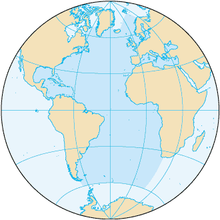
The Atlantic World comprises the interactions among the peoples and empires bordering the Atlantic Ocean rim from the beginning of the Age of Discovery to the early 19th century. Atlantic history is split between three different contexts: trans-Atlantic history, meaning the international history of the Atlantic World; circum-Atlantic history, meaning the transnational history of the Atlantic World; and cis-Atlantic history within an Atlantic context.[1] The Atlantic slave trade continued into the 19th century, but the international trade was largely outlawed in 1807 by Britain. Slavery ended in 1865 in the United States and in the 1880s in Brazil (1888) and Cuba (1886).[2] While some scholars stress that the history of the "Atlantic World" culminates in the "Atlantic Revolutions" of the late 18th early 19th centuries,[3] the most influential research in the field examines the slave trade and the study of slavery, thus in the late-19th century terminus as part of the transition from Atlantic history to globalization seems most appropriate.
The historiography of the Atlantic World, known as Atlantic history, has grown enormously since the 1990s.[4]
- ^ Armitage, David (2002). "The Concepts of Atlantic History". In Armitage, David; Braddick, Michael J. (eds.). The British Atlantic World 1500–1800.
- ^ David Eltis, et al. Atlas of the Transatlantic Slave Trade (2010)
- ^ Wim Klooster, Revolutions in the Atlantic World: A Comparative History (2009)
- ^ Alison Games and Adam Rothman, eds., Major Problems in Atlantic History: Documents and Essays (2007)